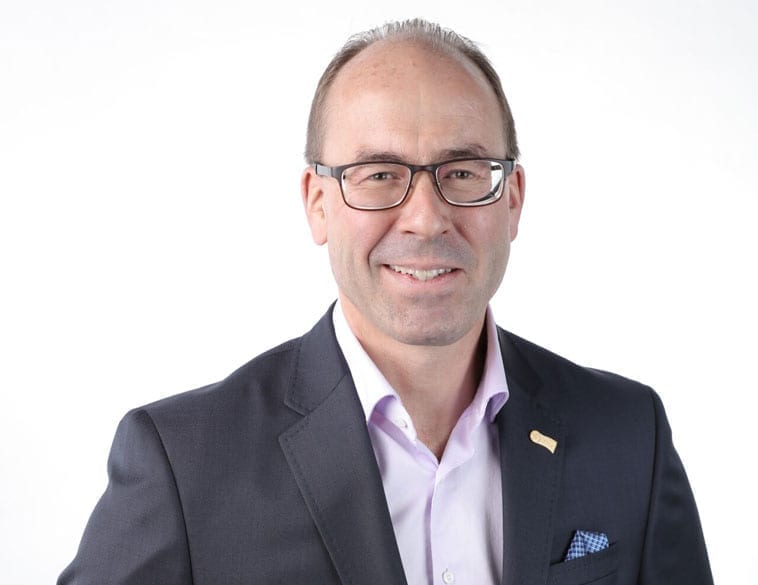Providing support and resources is critical during COVID-19, both for dealers and the communities they operate in.
Cliff Lafreniere is the current President of the Trillium Automobile Dealers Association (TADA), as well as the Dealer Principal of Pinewood Park Motors, a Ford dealership located in Kirkland Lake, Ont.
Given the current uncertainty regarding the COVID-19 crisis for many businesses, including automotive retailers, Canadian Auto Journal asked him about some of the ways dealers can navigate through this crisis, ranging from managing and protecting their staff and customers during lockdowns—including effective health and safety protocols—to accessing Federal emergency funds for businesses and ways that dealers and the communities in which they operate can make a difference, especially during a time when so many people are in need.
Canadian Auto Journal: As the President of TADA and also a dealer, what tips and suggestions do you have to help dealers navigate through the COVID-19 pandemic?
Cliff Lafreniere: I think one of the biggest difficulties many of us are faced with, is the fact that the COVID-19 situation continues to change so rapidly, day by day, and even hour by hour. Its therefore critical that dealers are able to access information and resources that are both accurate and verified. Both TADA and the federal dealers’ association, the CADA have created a specific COVID-19 section on their websites that provides information that is accurate and has been verified. We are encouraging dealers to make sure they access this information on a regular basis as the situation regarding COVID-19 continues to change. If the information is not verified as being accurate, it isn’t posted there.
CAJ: What do you feel have been some of most effective ways to continue serving customers during these uncertain times both from sales and service standpoint?
CL: On the service side, it’s important that dealers follow protocols from the health authorities in their community. Regarding our own store, we have closed the showroom and the service waiting area but continue to do business via contactless service. Vehicles are left overnight and are frequently shuttled back and forth in the community. Each vehicle is sanitized before the service department works on it and it is sanitized again before delivery back to the customer. Correspondence with our customers is now via text, email or phone and the same goes for payments. If a customer does ask to use a debit card for a transaction, we have put protocols in place to ensure the safety of both our customers and our staff.
Also, when it comes to social distancing measures and safety protocols for dealers, TADA also has some great resources on its website that members can access. In our case, we have made sure all our staff have reviewed these protocols and adhere to them as closely as possible. I cannot stress enough the importance of knowing what proper protocols are and learning the correct ways to follow them. For example, there are correct procedures in how you clean and sanitize a vehicle and even put on or take off gloves. In our case, some of the procedures we have adopted include disassembling and sanitizing our vacuums, washing the interior of the vehicle and sanitizing the carpet and letting it sit, as well as equipping staff with N95 and surgical masks for their safety. If you have any questions or are not completely certain about some of the safety protocols you now have to implement, your dealer association is a great resource.
CAJ: With the Federal government announcing financial aid programs to help businesses, how do you feel these programs can effectively help new car dealers during the short and perhaps medium term?
CL: Some dealers will likely qualify for the Canadian Emergency Business Account which provides a $40,000 interest free loan with $10,000 forgivable if the loan is paid off by a predetermined date. There are other dealers that will not qualify because for example, their payroll maybe too high. Other programs, such as the Canadian Emergency Wage Subsidy can be a huge benefit, as it covers a maximum of 75 percent of employee wages for those businesses that qualify. For dealers, this can represent a great opportunity to keep the business operating and keep staff working. In most cases, our biggest expense as a business is staff and payroll, so in situations like these where business is down significantly for so many of us, a program such as the CEWS can make a huge difference.
When the crisis first started unfolding here in Ontario and the provincial government began implementing a lockdown, TADA fought very hard on behalf of the dealers to ensure our operations were deemed essential businesses. In our case, being able to stay open and keep all of our staff working has proved to be a bit of a silver lining. We’re able to continue generating revenue on the fixed ops side and also keep our sales team operating, because they are able to respond to leads, contact customers via texting, email or phone and continue to help them by answering questions, as well as assisting with their next purchase or vehicle lease.
CAJ: With vehicle production and supply chains disrupted and along with it the delivery of new inventory for many dealers, what are some of the steps auto retailers can take to deal with these current disruptions?
CL: While the COVID-19 crisis has caused many OEMs to suspend vehicle production and has impacted the automotive supply chain, for many dealers, there is still plenty of inventory on the ground, so at present, a shortage of vehicles isn’t likely to present a major problem in most cases. There are some exceptions, such as a situation where a customer wants to factory order a new vehicle with specific, unique options—things like that won’t be possible until the OEMs ramp up production again. In most cases however, we’re still able to provide customers with the vehicles they need through existing inventory that’s available and we can still perform dealer trades if a customer is looking for a particular vehicle.
CAJ: Dealers are often major contributors to the communities they operate. Given how COVID-19 has impacted communities across the country, what do you feel are some of the ways that dealers and their communities can continue to help and support each other?
CL: It is well-known and well-documented in our industry that dealers often provide significant support in their communities, through sponsorship of local sports teams as well as support and donations to hospitals and local community projects. With COVID-19, we have to tilt our strategy a little and take a look at some of the ways we can really help, since in many cases we aren’t having people knocking on our doors.
A good example is helping provide PPE and medical supplies for the community. In our case, our local hospital was sending COVID-19 test samples from Kirkland Lake to Toronto and they were transporting them by taxicab. For workers on the front line, including physicians, nurses and hospital staff it’s essential that if they are tested, they receive the results right away, because they cannot return to work if the results are negative and need to self-isolate. In this case, it was costing the hospital $100 per hour to send samples from Kirkland Lake to Toronto and when you consider the journey there and back is 14 hours, it gets very expensive, very quickly. As a result, we decided to provide transportation for running these samples to and from the hospital by providing vehicles to use from the dealership. We’ve also been fortunate that we are now able to send supplies to Timmins, so it makes the situation a little easier. If a dealer is able to step in and provide services such as this, it means the hospital can then devote more resources to areas such as critical care needs and PPE supplies.
Other ways we can help our communities, is by providing complimentary pick up and vehicle delivery for customers including services such as seasonal tire changeovers or necessary maintenance. This can be especially beneficial for the elderly, those customers that might find mobility challenging or frontline workers that are extremely busy. You can also make a difference just by calling your customers and asking them how they are doing. A lot of the time, people really appreciate the communication and the ability to just stay in touch has become so important, especially when so many of us are confined to our homes.
CAJ: Although it is very hard to predict how things will evolve over the next few months from both an economic and social aspect, is there anything you’d perhaps like to mention or perhaps things dealers might want to be aware of?
CL: I can’t really make prediction on what will happen at this point because the situation continues to change so quickly. What I will say, is that at TADA and also at CADA our priority is to provide support for dealers during this time and work with government to navigate through this situation. One of our priorities is to look at opening dealer showrooms again, but I must stress that this needs to be done carefully and safely. We are working with the government to put the right protocols in place so that when we are ready, we can start getting our businesses back to a level of normal operating capacity, but it needs to be done carefully and responsibly. If we don’t do it correctly, we could find ourselves having to shut down businesses again and that would be devastating. Ultimately, history has shown that our industry is tough and resilient. Dealers are often very resourceful and innovative in both good times and bad. We will find a way to get through this situation and there are likely to be some changes as a result of COVID-19 that will make things better both for our industry and our country.



